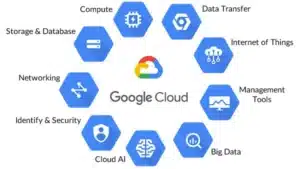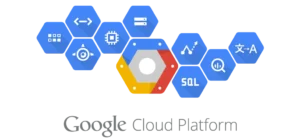In 2022, Google Cloud revenue reached 26.28 billion U.S. dollars, accounting for 9.3 percent of Google’s total revenues. The Google Cloud Platform (GCP) provides cloud computing services using Google’s infrastructure and is the primary revenue generator for the company’s Cloud segment. Beyond these stats, Google Cloud Services persistently innovates and offers transformative solutions for businesses worldwide.
As we chart the journey of Google Cloud from its inception to its current stature, we’ll delve into its evolution, expansive offerings, and the pros and cons businesses should consider. Join us on this comprehensive exploration, from its early leaps in 2008 to its present-day offerings and vision.
A Dive into Google Cloud Platform’s Evolution
The Initial Leap (2008-2012)
Google Cloud debuted, introducing revolutionary Google Cloud solutions:
- 2008: The Google App Engine ushered in a novel approach to developing and hosting web applications.
- 2010: Google Cloud Storage provided scalable storage solutions.
- 2012: Google Compute Engine, a virtual machine service, was built on Google’s robust infrastructure.
Expanding Horizons (2013-2015)
This period marked diversification:
- 2013: The portfolio grew with Cloud SQL, a managed relational database service.
- 2014: The launch of Cloud Datastore and Cloud Pub/Sub altered the landscape of NoSQL databases and messaging.
- 2015: Google Cloud Dataproc facilitated big data processing on Apache Hadoop and Spark platforms.
Focus on Enterprise and Strategic Acquisitions (2016-2017)
A shift toward larger enterprises became evident:
- 2016: The transformation to Google Cloud Platform (GCP) signaled an intensified enterprise-centric vision. The acquisition of Apigee showcased an inclination towards API management.
- 2017: The integration of Kaggle emphasized a push for collaborative machine learning.
Embracing AI & Advanced Technologies (2018-2019)
Machine learning became central:
- 2018: The introduction of Cloud AutoML empowered businesses to create bespoke machine learning models. The AI Hub emerged as the nexus for ML collaboration and deployment.
- 2019: The focus was on Google Cloud TPU (Tensor Processing Unit), optimized for swift machine learning operations.
Google Cloud Services Offerings
Networking and Security Solutions
Google Cloud Services offers robust networking and security tools to ensure businesses can operate safely:
- Virtual Private Cloud (VPC): Customizable virtual networks that isolate resources and ensure secure connections within Google Cloud platform services.
- Cloud Load Balancing: Balances incoming traffic across various regions or instances, ensuring applications are always available and perform optimally.
- Cloud DNS: A reliable DNS service that efficiently converts domain names to IP addresses.
- Identity and Access Management (IAM): A service that controls resource access, offering a secure way to manage permissions.
Data Analytics and Advanced Learning
GCP equips businesses to harness the power of data and artificial intelligence:
- BigQuery: This scalable data warehouse analyzes huge datasets swiftly and in real time.
- Cloud Pub/Sub: An efficient messaging service for building event-driven systems.
- Cloud Dataflow: A serverless data processing service that emphasizes real-time and batch processing.
- Cloud AI: A suite of tools for integrating AI into applications, including offerings like AutoML and Vision AI.
Further Exploration into Google Cloud Services
Google Cloud Services is more than just the mentioned products; it encapsulates a spectrum of Google Cloud products suitable for diverse business needs.
Infrastructure and Compute Solutions
Google Cloud Services offers a core Google Cloud for business services that provide the infrastructure required to run applications:
- Compute Engine: Infrastructure as a Service (IaaS) lets you run virtual machines.
- App Engine: A platform for building web applications and mobile backends.
- Kubernetes Engine: Managed Kubernetes service to deploy, manage, and scale containerized applications.
- Functions: A lightweight, serverless compute platform for running single-purpose code without provisioning or managing servers.
Storage Solutions
The foundation of any application lies in storing and retrieving data. Recognizing this, Google Cloud Services provides:
- Cloud Storage: Unified, scalable, and durable storage with robust data analytics.
- Persistent Disk: Reliable high-performance block storage for virtual machines and containers.
- Filestore: Managed file storage suitable for applications that require a shared file system.
Artificial Intelligence and Machine Learning
For businesses aiming to embed intelligence into their operations, Google Cloud Services offers a suite of AI and machine learning tools:
- AI Platform: A managed service that allows developers and data scientists to easily build, deploy, and monitor ML models. It supports multiple ML frameworks, such as TensorFlow, scikit-learn, and XGBoost.
- Vision AI: Pre-trained machine learning models that recognize thousands of objects, read printed and handwritten text, and more.
- Speech-to-Text and Text-to-Speech: Convert audio to text and vice-versa. These tools benefit transcription services, voice commands, and other voice-powered applications.
- Natural Language: Understand the structure and meaning of text with pre-trained models. It can be used for content classification, entity recognition, sentiment analysis, and more.
- Video Intelligence: Makes videos discoverable by extracting metadata. It can identify key nouns and detect scene changes.
Developer Tools
To further assist developers in deploying and managing applications, Google Cloud Services offers a variety of tools:
- Cloud SDK: A set of command-line tools for managing resources and applications hosted on Google Cloud.
- Cloud Build: A service that executes your builds on the Google Cloud infrastructure. It can import source code from multiple repositories, execute a build to specifications, and produce artifacts ready for deployment.
- Cloud Debugger: Allows developers to inspect the application at any code location without slowing it down.
- Cloud Endpoints: Aims to make it easy for developers to create, deploy, secure, and monitor APIs on Google Cloud.
With these vast offerings, Google Cloud Services caters to businesses’ infrastructure needs and aids in efficient application development, deployment, and management.
Google Cloud Platform: Pros and Cons
Benefits of Google Cloud Platform
- Scalability and Flexibility: Adaptable infrastructure tailored to diverse business needs.
- Global Infrastructure: Google Cloud products are hosted in data centers worldwide, ensuring reduced latency.
- Cutting-Edge Technology: GCP is an AI and machine learning leader offering business insights and automation tools.
- Security and Compliance: Significant investments ensure customer data is always protected.
- Integration and Ecosystem: Seamless integration with other Google Clouds for business services enhances its capabilities.
Potential Drawbacks
- Learning Curve: New users might feel overwhelmed with various services.
- Documentation and Support: Some users need help locating specific information.
- Pricing Complexity: Optimizing costs requires careful planning to avoid unexpected expenses.
- Vendor Lock-In: Transitioning away from GCP can be a daunting task.
- Limited Service Portfolio: While comprehensive, some niche services might be limited compared to others.
GCP’s Competitive Edge: Cost-Effectiveness and Flexibility
Adapting to Dynamic Business Needs
One advantage of Google Cloud Platform (GCP) is its flexibility, tailored to accommodate dynamic business requirements. GCP allows enterprises to adapt effortlessly to fluctuating data needs or traffic surges, ensuring they can swiftly respond to market changes without infrastructure constraints.
Refined Cost Management
Beyond the technical prowess, GCP has strategically positioned itself as a cost-effective solution for businesses. Its pay-as-you-go pricing structure eradicates the need for excessive upfront investments. This transparent pricing model ensures that companies are billed solely for the resources they consume. This approach reduces operational costs and ensures businesses can align their expenditures more accurately with their real-time requirements.
Read more:-Cloud Computing Solutions: Its Benefits & Types
In the End
Google Cloud Services is a beacon of innovation and scalability in the ever-evolving digital landscape. Its rich history and vast offerings underline its commitment to business transformation. Its focus on adaptability, cost-efficiency, and steadfast reliability sets a gold standard in cloud solutions. At advansappz, we recognize that embracing such platforms is the way forward, ensuring that businesses don’t just navigate but thrive in the digital era. GCP isn’t just a service – it’s the future’s blueprint.
Frequently Asked Questions
Google Cloud is a suite of cloud computing services provided by Google. It offers infrastructure, data storage, machine learning, and a wide range of other cloud-based solutions to help businesses scale, innovate, and streamline their operations.
Google Cloud services are versatile and can benefit a wide range of businesses, from startups to large enterprises. Whether you need to host websites, process data, or develop machine learning models, Google Cloud has solutions for various industries.
Google Cloud offers services such as Google Cloud Platform (GCP), Google Workspace, BigQuery, Cloud AI, and many more. These services cover cloud infrastructure, productivity tools, data analytics, and artificial intelligence.
Google Cloud provides tools for data storage, analysis, and visualization. BigQuery, for instance, allows businesses to analyze massive datasets quickly and efficiently.















